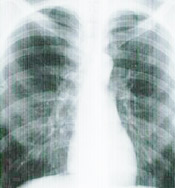
London, Jan 13: A completely drug-resistant strain of tuberculosis found in Mumbai (India) is new cause of concern for medical practitioners around the world. This new finding has raised alarm for the authorities and those working for the preventions of this once deadly disease.
Knowing the gravity of the situation, World Health Organization is about to held a meeting to assess the evidence and decide ways to deal with it.
The newly found strain of TB, called Multidrug-resistant (MDR) TB, has shown resistance to all of the main TB drugs. It may develop into a situation where patients can find no help other than the defense mechanism of the body i.e. immune system.
The problem came to the fore in early 90's and later extensively drug-resistant (XDR) TB emerged in 2006. It has compelled medical practitioners and those fighting for the prevention of TB to give full attention to drug-resistant (TDR) tuberculosis.
This totally drug resistant TB strains may be new to India but it is not new to world. At first time, it was reported in Italy in 2007, in two patients. In 2009, it was found in 15 patients in Iran.
"We currently have 12 confirmed cases, of which three are dead," Zarir Udwadia of the Hinduja National Hospital and Medical Research Centre in Mumbai has been quoted as saying in the New Scientist.
Discovery of these strains in a city like Mumbai is also worrisome as it is densely populated and hence it may spread the disease quickly.
"It's estimated that on average, a tuberculosis patient infects 10 to 20 contacts in a year, and there's no reason to suspect that this strain is any less transmissible," Udwadia has been quoted as saying.
While taking of preventive measures he said that the patient should be kept in isolated wards in hospitals in order to check further infections. But it is hard to put into practice. He alleged that
Poor management of MDR can be held responsible for the current situation.
The normal strain of TB has been very effectively dealt with in India's national programme, the same level of support and treatment has not been given to MDR-TB patients, as it is costly.
"Years of mismanagement of MDR-TB at government and private care levels resulted in amplification of the level of resistance till we finally ended up with this untreatable strain," Udwadia has been quoted as saying.
Paul Nunn, coordinator of the STOP TB department of the WHO in Geneva, has asked governments to provide better support and medication regardless of the cost.
"It's a wake-up call for countries to accelerate provision of proper care, particularly for multidrug-resistant patients," he was quoted as saying.
--With inputs from ANI
|
|


Comments: